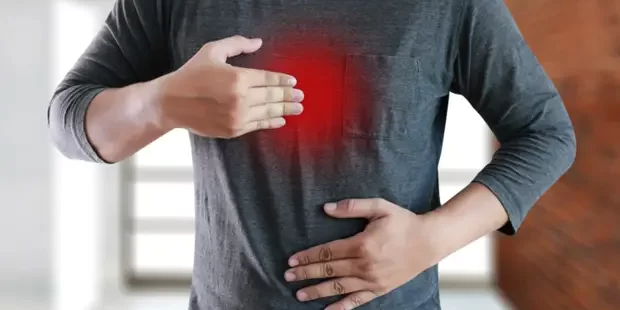Within this blog we will be covering all the key points to know about what causes acid reflux. This includes what acid reflux is, what causes it, the effect of acid reflux on the mouth, how acid can damage the mouth, and how to protect teeth
What is Acid Reflux and What Causes It
Acid reflux is a very common problem, with studies showing that millions report symptoms of acid reflux at least once a month and a high percentage of this have symptoms every day. Acid reflux instigates pain in the centre of the chest, typically after a meal and may be referred to as heartburn. This pain arises from the acid damaging soft tissue in the oesophagus, as the acid travels from the stomach to the throat. However, the effects of acid reflux go beyond the oesophagus, and often can make its way to the mouth.
The core reason for acid reflux is a malfunction of the valve which separates the oesophagus and the stomach. If this valve is functioning properly then it operates on a one-way basis, in which food passes from the oesophagus to the stomach and stomach acid should not be able to move backwards into the oesophagus. However, acid reflux means that the valve functions incorrectly and allows for these backward movements of stomach acid.
Effect of Acid Reflux on the Mouth
The acid within the stomach is highly acidic, usually between pH 1.5 to 3.4. While this low pH is useful in breaking down food within the stomach, it can be damaging when it interacts with the oesophagus or mouth. Subsequently, if an individual has chronic acid reflux then they will likely have a very low pH in the mouth due to this stomach acid backflow.
Usually a mouth should have a pH that is just over neutral, which should be just above pH 7. This ensures that the soft tissues and teeth within the mouth are healthy. However, studies of acid reflux sufferers show a significantly lower pH level in the mouth when compared to a healthy individual.
How Acid Damages Teeth
Acid reflux is a major concern in dentistry due to the major damage it can have on teeth. Despite enamel being the hardest substance in a human body, it is possible for acid to soften and weaken it significantly. Some key reasons why acid reflux is particularly problematic for teeth has been detailed below.
- The acid itself from acid reflux can lead to enamel erosion, which results in the underlying tooth structures becoming more visible. This part of the tooth is a darker yellow colour, and can mean teeth appear yellow and stained. Additionally, the weakening of the enamel increasing the chances of cavities, sensitivity and cracks.
- Acid within the mouth also creates the perfect environment for bacteria to thrive and in turn increases cavity risk significantly. This is because acid wears away at the enamel and allows bacteria to enter the tooth. In turn the bacteria can multiply and lead to further issues in the tooth.
- Acid reflux can indirectly be problematic due to the medication that individuals may take when managing acid reflux discomfort which can potentially have a negative impact on the teeth. This is because acid reflux mediation not only relieves pain but may also lead to dry mouth, which reduces saliva production. By reducing the amount of saliva, which is a slightly alkaline substance, the effects of acid within the mouth are worsened and the risks it poses to teeth subsequently increased.
How to Protect Teeth
If you are one of the many sufferers of acid reflux then it is essential that you undertake preventative measures to deal with the negative impact it can have on your teeth. Some tips on how to protect your teeth from acid reflux have been outlined below.
- Chewing on sugar free chewing gum can encourage saliva production in the mouth and subsequently reduce the acidity of your mouth. This will however only work if the gum is sugar free, as chewing gum which has sugar will still be problematic.
- Maintaining impeccable oral hygiene is also key to minimizing the negative impact of acid reflux. This involves daily brushing and flossing to minimize the potential bacteria/plaque within the mouth. Tooth whitening toothpaste should however be avoided due to the abrasive effect on teeth, which have already been weakened from acid.
- Acidic drinks should be avoided when possible, as it will add to the already acidic environment within your mouth and cause further damage. The safest drink to consume would be water, with fizzy drinks, energy drinks, coffee and alcoholic drinks all being potentially problematic.
- Regular dental visits are also essential as it can ensure that your oral situation can be assessed to spot the negative impact of acid reflux and how it can be dealt with. This may include options such as fluoride treatments. It can also allow for dental cleanings to take place to remove plaque/tartar which may have built up.
- Any acid reflux medication you are taking should be only taken when absolutely necessary, due to the potential for dry mouth and other negative repercussions. Obviously it may not be possible to stop completely, but you may be able to get advice from your doctor on natural methods to deal with acid reflux or alternative medication which is less problematic.

